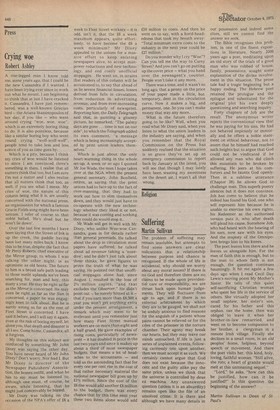Religion
Suffering
Martin Sullivan
The problem of suffering may remain insoluble, but attempts to find some answers are clear indications that a relationship between purpose and chance is recognised. If the whole of life is accidental, why should we worry about any moral issues? If there is no God and therefore there are no claims to be made upon providential care or responsibility, we are thrust back upon human judgements. They will fluctuate from age to age, and if there is no external arbitrament by which they are to be gauged, we shall not be unduly anxious to find reasons for the anguish of a patient whose pains cannot be relieved or for the cries of the prisoner in the torture chamber. Their agony may break our hearts, but they may leave our minds untouched. If life is just a series of unplanned events, following carelessly one upon another, then we must accept it as such. We certainly cannot argue that God does not exist because the innocent and the guilty alike pay the same price, unless we think that the universe is controlled by deus ex machina. Any unanswered question (unless it is an absurdity) remains open like the file of an unsolved crime. It is there and although we have many details in
our possession and indeed some clues, still we cannot find the answer we seek.
The Bible recognises this problem, in one of the finest expositions in literature. Nearly 2500 years ago a poet, meditating upon an old story of the trials of a good man who was robbed of house, family, possessions, sought some explanation of the divine involvement in this situation. The prose tale had a tragic beginning but a happy ending. The Hebrew poet retained the prologue and the epilogue and substituted for the original plot his own deeply questioning and searching inquiry.
Forty chapters of Job are the result. The anonymous writer rejects the conventional view that he was paying for his sins. He had not behaved impiously or immorally and he offers a noble statement on ethical behaviour, not to assert that he himself had reached such heights but to argue that God could not be vindicated if he allowed any man who did climb this mountain to be broken by suffering. He jeers at his comforters and he taunts God openly. Then in a sublime utterance (Chapter 38) he allows God to challenge man. This superb poetry silences but it does not convince. Job has come to believe that he indeed has found his God, one who will represent him because he is unable to exercise his own rights, his Redeemer as the authorised version puts it, who after death will plead his cause. Somehow Job, who had heard with the hearing of his ears, now saw with his eyes. And the majesty of the Omnipotent brings him to his knees.
The poet leaves him there and he leaves us alongside him. For the man of faith this is enough, but to the man to whom faith is not enough, the question continues hauntingly. It hit me again a few days ago when I read Cecil Day Lewis's moving poem My Mother's Sister. He tells of this quiet self-sacrificing Christian woman who spent her life in the service of others. She virtually adopted her small nephew, her sister's son, cared for his father and this orphan, ran the home, then was obliged to leave it when her brother-in-law remarried, and went on to become companion to her brother, a clergyman in a remote Irish village. Finally she declines in a small room, in an old peoples' home, helpless, beyond speech or movement. And there the poet visits her, this kind, holy, loving, faithful woman. "Still alive, she rots; a heart of granite would melt at this unmeaning sequel."
"Lord," he asks, "how can this be justified, how can it be justified?" Is this question the beginning of the answer?
Martin Sullivan is Dean of St Paul's


































 Previous page
Previous page